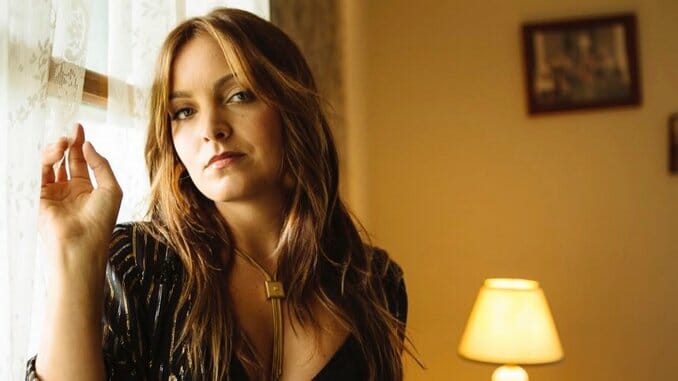Brit Taylor Gets Real on Her Solo Debut
Photo courtesy of the artist
Some kids dream of growing up to be doctors, firemen, even astronauts. Not Brit Taylor. Ever since gradeschool, she’s known exactly what she wanted to do as an adult—a professional country singer, no aside-whispering stage mother required.
“I come from a really small Kentucky town, but because of artists like Dwight Yoakam and Patty Loveless and Loretta Lynn, the area really fosters country music and young entertainers,” says the hickory-smoky chanteuse, who joined the local Kentucky Opry’s children’s chapter The Junior Pros at age seven and even once regaled Yoakam himself in concert. “So I’ve been singing on a really cool stage—with a real band—ever since that age. And my mom was never pushy—she’s as easygoing as it comes.”
A family friend overheard the young warbler trilling, and suggested a Kentucky Opry audition, which she passed with flying colors. “So this is the only thing that I ever wanted to do, and I think because I started so young, I just never thought about anything else.”
But a funny thing happened on the way to Music Row notoriety. Make that several things, and none of them all that amusing, in cold, clinical retrospect. At 31, Taylor released her retro-C&W debut disc Real Me last year on her own label, Cut a Shine, which is hillbilly slang for a temper tantrum. And—although the Dave Brainard-produced, Dan Auerbach-assisted effort features her smoky singing voice on everything from barn-dance waltzes (“Raggedy Heart,” “Broken Heart Breaks”) to the Western-swing “Go Down Swingin’,” the honky-tonk growling “Married Again,” and Dusty in Memphis-plush experiments like “Back in the Fire”—she had every right to throw a frustrated hissyfit. And Yes, she sighs, 2020 was a dismal, soul-trying year. But personally, she admits that she’s experienced worse. Like 2017, in particular, when all of those childhood dreams shattered in the space of only four months.
“If my life were a sitcom, it would be a dark, dark comedy,” she says. “Because it’s kind of hilarious, but just not that funny when it’s your own life.”
Paste: Where have you been quarantining?
Brit Taylor: I am right outside of Nashville in a little town. I moved to Nashville when I was 17, and I lived in East Nashville. But it never really felt like home. I grew up on top of a mountain in East Kentucky, so I found a spot outside of Nashville, and there was was a little over three acres, and it was right in my price range, almost out of it. So I’ve been out here for eight years now, and I’ve got six goats, three dogs, some chickens, and a three-legged cat named Loretta, after Loretta Lynn.
Paste: But you actually kind of lived a country song, didn’t you?
Taylor: Yes. It was kind of comical. 2017 was such a crappy year, and it all happened so fast, just like everything falling apart. First, my husband of five years walked out on me. Second, I was in a band called Triple Run—which was named after moonshine, because you have to run moonshine through a still three times—and my bandmate, who was one of my best friends, suddenly just quit the band. Then my computer literally exploded, then my dog died. And the one shimmer of light that I had in my life at that point was a co-write with my now-producer Dave Brainard. But on the way to the write, my car broke down and I could not make it. And something had happened to my Triple A card—my now ex-husband had the card at the time, and they wouldn’t let me use unless he was there with me, but we weren’t even communicating at the time. Oh, my God. It was just awful, and I was in tears. It felt like the whole world had turned against me. And all my fiends were answering on the first ring every time back then—they were like, “What now? What’s happened? Are you okay?”
Paste: And Dave is a Grammy-winning guy. A lot of times, you may not get a second meeting with someone like that.
Taylor: I know! But luckily, he was cool with rescheduling. And then we started writing, and I don’t even know if he knew what was going on in my life at the time, because I was still in the band. So we wrote a few songs that year, and in December my option on my publishing deal was up, and they had actually wanted me to continue as a solo artist and sign an extension on the deal. But I just couldn’t—I felt like I had to start over. So I actually turned it down, which made me jobless. So I called Dave and said, “I don’t have a publishing deal anymore, I’m divorced, and I also quit the band. But I’d still like to write songs with you.” And he called me immediately after he heard that voicemail and jumped on board. I think Dave likes a good country story, and a good heartache.
-

-

-

-

-

-

-

-

-

-

-

-

-

-

-

-

-

-

-

-

-

-

-

-

-

-

-

-

-

-

-

-

-

-

-

-

-

-

-

-








































